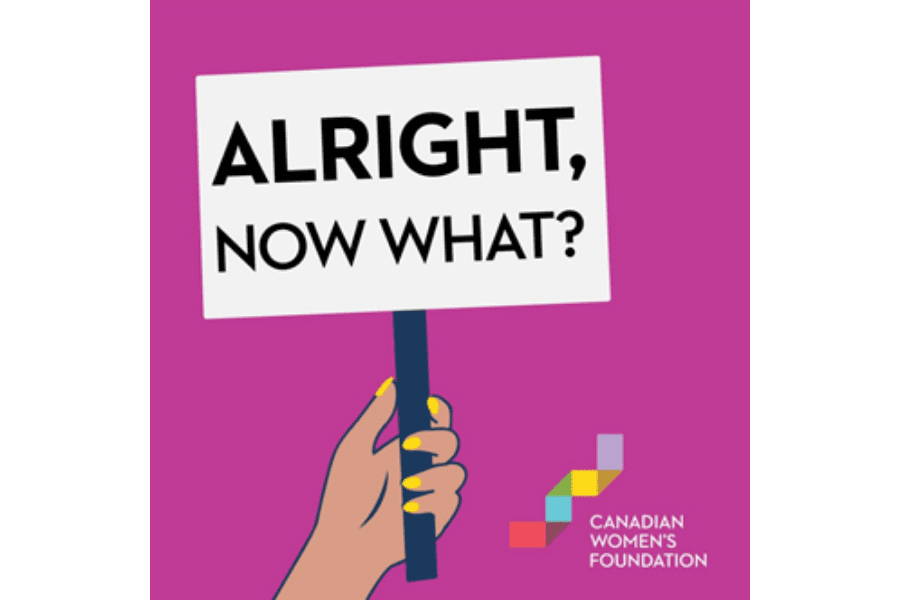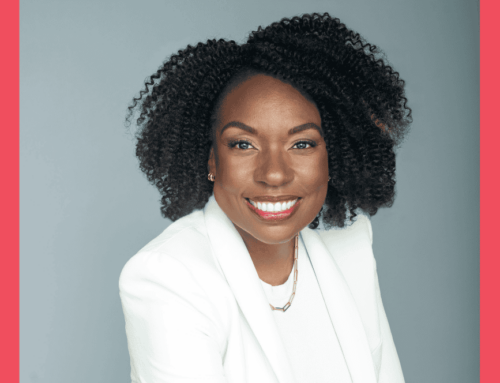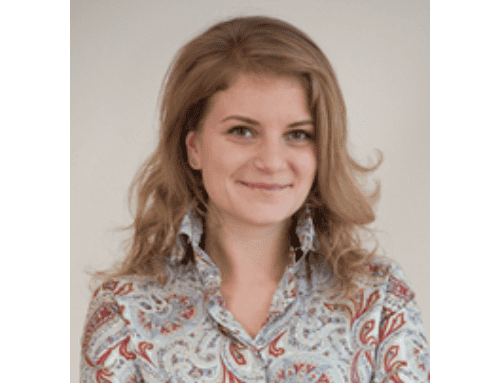Welcome to Signal for Help, a special podcast series from the Canadian Women’s Foundation and award-winning women journalists, Media Girlfriends.
We know that gender-based violence is a problem, and we want to support survivors in our lives, but there’s a lot of stigma and silence around gender-based violence in our society: too many people who experience abuse are shamed, silenced, and stigmatized, and too many people don’t feel confident and competent in supporting them.
Featuring interviews with survivors and experts, we’ll explore how everyday people can better support survivors of gender-based violence.
This podcast includes stories of gender-based violence. Please listen with care.
In this final episode, we meet Sherrie, a survivor of intimate partner violence who has so much wisdom to share. Her story is one of family, faith, and what can happen when the institutions we trust fail us.
Sherrie and her four children suffered control and abuse for years at the hands of her ex-husband. She attempted to leave the relationship many times, eventually doing so after two particularly difficult experiences involving her children and the final realization that her ex-husband “won’t lift a finger to help me, not even when I am in serious need of help. He would let me die.”
Now free, she uses her experience to power her life’s work supporting immigrant and refugee women in Winnipeg impacted by violence.
Her biggest message: there are many ways we can offer support, but we can’t force someone to leave an abusive relationship. That decision is always for the survivor to make.
A big thank you to Sherrie, for teaching us, and to all the women who spoke with us throughout the series: Eternity, Ruby, Bernadette, Yasmin and Taghreed, and Brandi. If you haven’t heard these episodes yet, go back and listen. Every woman has a story and very practical advice on what we can do to support someone experiencing abuse.
Transcript
00:00:01 Nana aba
Hi. This podcast includes stories of intimate partner abuse and gender-based violence. Please listen with care.
Welcome to Signal for Help. I’m Nana aba Duncan.
Before we get started today, I want to ask: Why are you listening? Why are you here right now? Just think about it for a moment.
I’m going to guess you’re here because you’re curious, you want to learn, and more than anything, you want to help. There are simple ways we can support people who are experiencing abuse. When you know how, and that’s what I’ve been thinking about.
We have learned so much through the stories that women have shared on this podcast about their personal lives and their professional advice on how to become a responder when someone gives you a signal for help. And that’s the whole reason why we made this podcast with the Canadian Women’s Foundation. For you and for me. There’s so much to learn because it’s on us to be prepared for when someone in our life needs us to support them.
OK, let’s get to the conversation for today.
00:01:16 Sherrie
I have realized that no matter what other people tell you, you have to own your own decision. You and you alone. Even your kids. Because I had my kids telling me “Mom, please leave. Please leave” for a long time. I had other people saying, “You should leave” and I tried five times, but I kept going back, thinking he’ll change. He’ll change. He’ll change. Until the 6th time.
00:01:41 Nana aba
That’s Sherrie. In 1979, she married a man she met in Bible college. He quickly became controlling and abusive. They had children, and they were married for 26 years. During that time, she tried to leave, but it took six tries before she finally did it successfully. That experience taught her how to help other women as they escaped to start new lives, so she knows what they need. And, that is unconditional support and practical help.
So, Sherrie is going to tell you her story about her family, her children, and how she was betrayed by leaders in her church.
She’s got so much wisdom to share, but her biggest message is that you can’t make anyone leave an abusive relationship. It’s got to be the survivor’s own decision to make.
00:02:35 Sherrie
My name is Sherrie Winstanley, and I live in Winnipeg, MB, have for a long, long time. I am the executive director of a charitable nonprofit that I founded 10 years ago. That is called S.H.A.D. E. (S-H-A-D-E), and that’s an acronym that stands for Safe Housing and Directed Empowerment. The goal is to come alongside immigrant and refugee women for a season in their life to support them as they journey through a very, very dark time in their lives leaving intimate partner violence.
00:03:16 Nana aba
It sounds like a lot of the work that you do is actually pretty life-changing.
00:03:21 Sherrie
I hope so.
00:03:23 Nana aba
So, Sherrie, what were you like as a child?
00:03:27 Sherrie
Well, I guess, I was pretty much of a loner. I read a lot, I studied a lot, I wrote poetry, I still do. You know what, to be honest, when I was eight years old, I experienced childhood sexual assault. And after that I realized that my parents couldn’t protect me from young boys or men that had evil desires, so I really preferred to stay under the radar. You know, like not attract attention and not cause waves. I found that it developed in me like a hyper alertness to danger or even perceived threats to danger. I insulated my unsafe self by writing. Like that’s when my poetry writing started, when I was in my early teens. And, it also was the time where I began to cultivate my faith in God.
00:04:21 Nana aba
So, are you saying that church, the Bible was a big part of your youth?
00:04:26 Sherrie
Uh yeah, yeah, for sure it was.
00:04:31 Nana aba
What kind of role did it play in your life at that time?
00:04:34 Sherrie
So, we would go to like Friday evening groups where there was a lot of guitar singing. And, you know, Bible studies for youth, just connection. We would go to beaches together as whole groups.
I was married when I was 23, and I was in an abusive relationship for 26 years. So, you know, if we’re talking about church involvement, it was on and off over the years. I met my husband, believe it or not at Ontario Bible College in Toronto.
00:05:07 Nana aba
I want to know more about that time with your husband at the time, and I’m sorry to hear about what you have had to go through for so many years, because you had children as well.
00:05:20 Sherrie
You’re right, I raised four amazing children, who are now all young adults, and they’re pursuing their passions. Now the abuse began three months into the marriage. I left the relationship five times, sometimes to a local women’s shelter. But the sixth time I stayed in the family home here in Winnipeg and my ex was ordered to stay away.
00:05:47 Nana aba
Sherrie, do you mind if we go back to the first time you wanted to leave or your first attempt to leave?
00:05:53 Sherrie
No, I don’t mind.
00:05:54 Nana aba
What happened that first time?
00:05:57 Sherrie
We were living in Victoria, BC. We were newlyweds. My husband was to start working in a church to get his masters of something, I don’t even remember what it was, and I wanted to be able to support him. So, I found work at a local bookstore, and I realized I needed some more clothes to work. Just because you want to look professional. So, I told him I would like to buy a pair of navy pants. And he said, “OK, you can go buy a pair of navy pants.”
So, I ended up coming home with a pair of navy pants, a pair of blue jeans and two t-shirts that matched. So, I felt like I had lots of outfits to interchange. And so, when I went to show him. He goes “I told you could only get a pair of navy pants. Take the jeans and the two t-shirts back”. And I said “No”. And he said “You either take them back or I’m never talking to you again.” And I said “I’m not taking them back”. And so, he gave me the silent treatment for a whole week.
And I made a call to my parents, and they drove my 17-year-old younger sister to Toronto Airport and she was about to board the plane to come and get me. And I told my husband minutes before she was going to board the plane. I said, “So, I’m leaving you. I am going back because you’re not speaking to me.” He goes, “Whoa, whoa, whoa, whoa, whoa, whoa”. He goes, “No, no, no, we can talk about this”, I said, “My sister is on her way. She’s going to be coming out here and I will be leaving.”
So, he insisted that I get a hold of her and so she goes “Sher, are you sure you don’t want me to go?” and I said, “I am so, so sorry.”
So, my parents were livid. So yeah, you know, like you get isolated, they cut off relationships with your family members. You know, he made promises that things would change. But, you know, that was the first incident. My life would have changed a lot drastically if I had left at that time, because I didn’t have any children.
00:08:13 Nana aba
So, there was so much you had to endure, and I’m interested to know about what you see as red flags, looking back. What would have been some red flags for people close to you?
00:08:25 Sherrie
Super decreased communication with, especially with my family. If they asked me probing questions, I was super evasive. I just would skirt around the issue, I would not answer their question directly.
And the summer of 2004, I lost 27 pounds in 2 and half months. Well, that’s not normal weight loss. I would be constantly tired, constantly tired.
I would make up excuses for my husband’s not wanting to go certain places or his odd and disturbing behavior. I would just make up excuses.
And I was very lethargic, like I lost interest in a ton of things I used to be interested in.
Not living as close to my family, was able to cover up for that as well, you know. Look, I know my family loved me to death and they would do anything in their power to have their daughter safe. They offered me a safe refuge in their home. They had at one point tried to bring me home with a free airplane ticket.
I think I have realized that no matter what other people tell you, you have to own your own decision. You and you alone, even your kids. Because I had my kids telling me “Mom, please leave, please leave,” for a long time. I had other people saying, “You should leave” and like I tried five times, but I kept going back, thinking he’ll change. He’ll change. He’ll change. Until the sixth time.
But even the fifth time was pretty bad, but you have to own it, because if somebody else makes that decision for you and things don’t go the way you think they should, you’re going to blame them and then you’re going to lose out on even that support system.
00:10:20 Nana aba
So in the end, you made that decision for yourself as you were talking about. But what was it? What was it about that last time?
00:10:31 Sherrie
Really, I had already lost my son, my first son.
00:10:37 Nana aba
What do you mean by that? Losing him?
00:10:38 Sherrie
So, the biggest and the most difficult thing that my children and I experienced, which has had lasting impacts to this day on us all was the intrusion into our lives by a senior pastor of a local church that I used to attend. I say used to. This pastor, totally clueless about intimate partner violence, was naive enough to believe my husband when my husband said our marriage wasn’t working because of our oldest son. I mean that is nonsense to believe.
My son is a super creative person, and so he has set up a new business. All the design work, all his contacts, all his offers, my husband deleted them with no backup. He was going to the University of Manitoba. He deleted all of his notes. My husband did this intentionally, to harm our son, intentionally. My son was devastated.
I heard this awful scream when he saw that none of his stuff was there. And I’m like, “I can’t handle this.” They’re screaming, name-calling. I mean, it’s just a hoard explosion in our home between my ex and our oldest son. And so, I ran out of the house in my pajamas with my two youngest kids.
That man who called himself a pastor told me that I needed to kick out my son out of the house and let my husband back in. Why? Because I wasn’t married to my son. Because my son was 20-years-old and old enough to be living on his own. And because with this son gone, then, if there were still problems in our marriage, then we would know it wasn’t my son, it was my husband. And now that is seriously messed up. But unfortunately, who I was back then is not who I am today. OK? I was vulnerable, and all I could think of was that this son could escape the abuse.
So, I told this excuse of a pastor that I could not kick out my son out of the home because he was innocent, as he always was. So, he said he’d come over and he’d tell this son to move out. And my deadly error, which I regret to this day, was in allowing that bastard pastor into my home.
That was 18-and-a-half years ago. I only saw my son for a few months after he moved out. So, I lost contact with him.
I’ve come to realize that faith-based places or religious so-called sanctuaries can be far from safe spaces. There’s usually leadership in any faith-based organization. And I think they need to do the trauma-informed training. But also training on what intimate partner violence involves. You know, and they need to make policies because there are people in their congregations, in their, in whatever community it is that are experiencing intimate partner violence. These women are terrified because they will lose even more of their support system by being not allowed in that community.
My husband was more allowed in our church than I was. The first time we showed up for court, my lawyer looked and she goes “Who’s that with him?” I said “Oh, that’s an elder from our church” And she’s looking around, she’s going “Well, where are the elders to support you?” I said, “There aren’t any.”
I’m sorry, but I felt so ostracized. I don’t go to that church anymore.
Do you want to know what made me finally leave the abusive relationship?
00:14:42 Nana aba
Yes, please.
00:14:44 Sherrie
There were two things. Two incidents that occurred close together in December of 2005.
So, the first one was the realization that I was about to lose our second son, that month. I overheard this son talking with his younger sister behind closed doors, expressing his concern that with him gone, then their father would soon begin to abuse her. Because he always needed mom plus one child to abuse, and she was next in line. That just wrenched me.
And that and a week or so later, I ended up with a nosebleed so bad that my 2 middle children took me to the emergency room, where the doctor tried to cauterize it. And failing that, he plugged up my nostril like up to my forehead with cotton or cloth or something. And in the morning, when my husband came out of our bedroom, he saw me, and he nonchalantly said “Another nosebleed, eh?” He didn’t offer any sympathy or any empathy. He just turned to leave. But my daughter blocked him from leaving and she said “Dad, did you hear anything last night?” And he scoffed and he said, “Yeah, I heard something. I just figured it was someone vomiting. I don’t get up for vomit.”
I had an awakening. This guy won’t lift a finger to help me, not even when I am in serious need of help, he would let me die. So, something in me snapped during that super brief exchange. My love for that human being died. I resolved to take action for the sake of my remaining three children and myself. I decided we do not need to live anymore like this and the only person that’s going to make any change happen is me.
It was terrifying. I was done though. I checked out of that relationship in every way during those seconds.
So, early January 2006, I met with my lawyer and we were in court two weeks later, at which time the judge granted me a protection order.
00:16:55 Nana aba
How did you feel after you made that decision?
00:17:02 Sherrie
A relief. I think, a huge relief and scared. It’s terrifying. Change even when it’s going to mean something better. You’re losing something. You’re losing routine, even if the routine is normal and it’s abusive, you’re losing something, and it’s terrifying.
00:17:38 Nana aba
I want to know about what a person can do to go from being a bystander to a responder. What’s one thing a person can do?
00:17:46 Sherrie
There are signs indicative of somebody needing help, right? Like there’s signs that we see with our eyes. Like, for example, we might see bruises or welts or burns or scars. We might see, like I told you, we might see somebody’s lost weight or put on weight, people show signs of shame and fear too.
00:18:08 Nana aba
What does that look like?
00:18:10 Sherrie
Not being able to look you in the eyes or explain injuries. Staying away from social venues when they used to go. Being very, very quiet, basically having your support system shrink and shrink and shrink until maybe it’s not even existent anymore. It’s being hyper vigilant to your environment, your surroundings. Because you know that you’ve been trained, that it’s not always safe. I’ll give you an example, when I go into a room, I’m usually in the corner. I want to see who else is coming in because I want to know who’s safe and who’s not. And I didn’t even realize they did that for the longest time.
Absenteeism, if you are employed, it could be an explanation. So, we need employers to be aware and sympathetic to absenteeism of employees and to be able to be a safe person, to approach and understand. Because you know, you don’t want to put your only source of income in jeopardy, especially when you’ve got kids. When you’ve got bills to pay.
Attempts at suicide, substance use, alcoholism. Explanations that don’t match injuries.
What can a bystander do? Educate yourselves. Always educate yourselves. We can ensure that we are safe people to disclose stuff that we don’t disclose to hardly anyone. We can be accepting and compassionate. That’s the opposite of being judgmental, right? And we need a strong, dependable, trustworthy circle of support.
So, you know what, society has spread myths about why a woman stays with her abuser and other individuals have hang ups or misconceptions about why a victim stays with her abuser. Why does she tolerate that behaviour? Why, why, why? Why does she. You know? And that, that really annoys me to no end. I think perhaps we ought to reframe such questions and turn the focus of attention on the abuser and ask him, why do you choose to keep abusing your wife, your girlfriend, your children, right?
00:20:20 Nana aba
Thank you so much, Sherrie.
00:20:23 Sherrie
You’re welcome.
00:20:34 Nana aba
I am grateful to Sherrie. Not only did she share her story with us, she uses her experience to power her life’s work and help other women who find themselves in a similar situation.
And, I really appreciated that she talked about how church elders need to be informed on how to deal with intimate partner violence, and that makes sense. Every leader, in every community, needs to know what to do when someone comes to them for help. I’m also glad she went on to find a church community that felt right for her.
That story of needing six tries before leaving successfully, it was also really powerful. Research shows that it can take many attempts for someone to leave. Research also shows that when a woman leaves an abusive partner, that’s actually when she’s most in danger. Women are six times more likely to be killed by an ex-partner than a current partner.
There are many reasons why it can take someone multiple attempts to leave. They may have dependents like kids or pets, there might be financial reasons, or values and beliefs that stop them from leaving. And the truth of it is that someone experiencing abuse may never leave. But, that doesn’t mean we can’t support them. We can.
Sherrie told us she needed to make the choice for herself, no matter how much her kids or her parents and sister told her she should leave, it was Sherrie’s choice alone, and she made it. She did it. It is always the survivor’s own decision. Let them take the lead, that’s what I’ve learned. We, the people around them, we can do helpful things so they can be empowered to make that decision for themselves. Listen, don’t judge, be open, and be patient.
So, a big thank you to Sherrie for teaching us and thanks to all the women who spoke with me: Ruby, Eternity, Brandi, Yasmine and Taghreed, and Bernadette. If you haven’t heard these episodes, go back and listen. I promise every woman has a story and very practical advice on what you can do when you get a signal for help.
To learn more, sign up to be a Signal for Help Responder and join the learning journey, or take the free mini course. There are scenarios there that you can click-through with choices to make. You can test your knowledge and it might surprise you. Go to signalforhelpresponder.ca.
And if you want more listening, did you know the Canadian Women’s Foundation has another podcast? It’s called “Alright, Now What?” and you can find it on your favorite podcast app. That’s “Alright, Now What?”
Thank you for listening with compassion and curiosity. We have learned a lot together, so keep that learning going. Because when you know how to respond to signs of abuse, you can change the story.
Signal for Help is a podcast from the Canadian Women’s Foundation, made by Media Girlfriends.
Producers of this show are Garvia Bailey and Hannah Sung.
Associate editor is Elena Hudgins Lyle.
Post-production is by David Moreau.
And, I’m Nana aba Duncan.
Please take care of yourself as you listen to these episodes. If you need support, go to signalforhelpresponder.ca and click on “Get Help” for links to services and information. Thank you for listening.
This project has been funded by Women and Gender Equality Canada.

The Canadian Women’s Foundation has another podcast called “Alright, Now What?” that puts an intersectional feminist lens on stories that make you wonder “Why is this still happening?” Through expert interviews, we explore systemic roots and strategies for change that will move us closer to the goal of gender justice.
Subscribe and listen wherever you get your podcast content.







